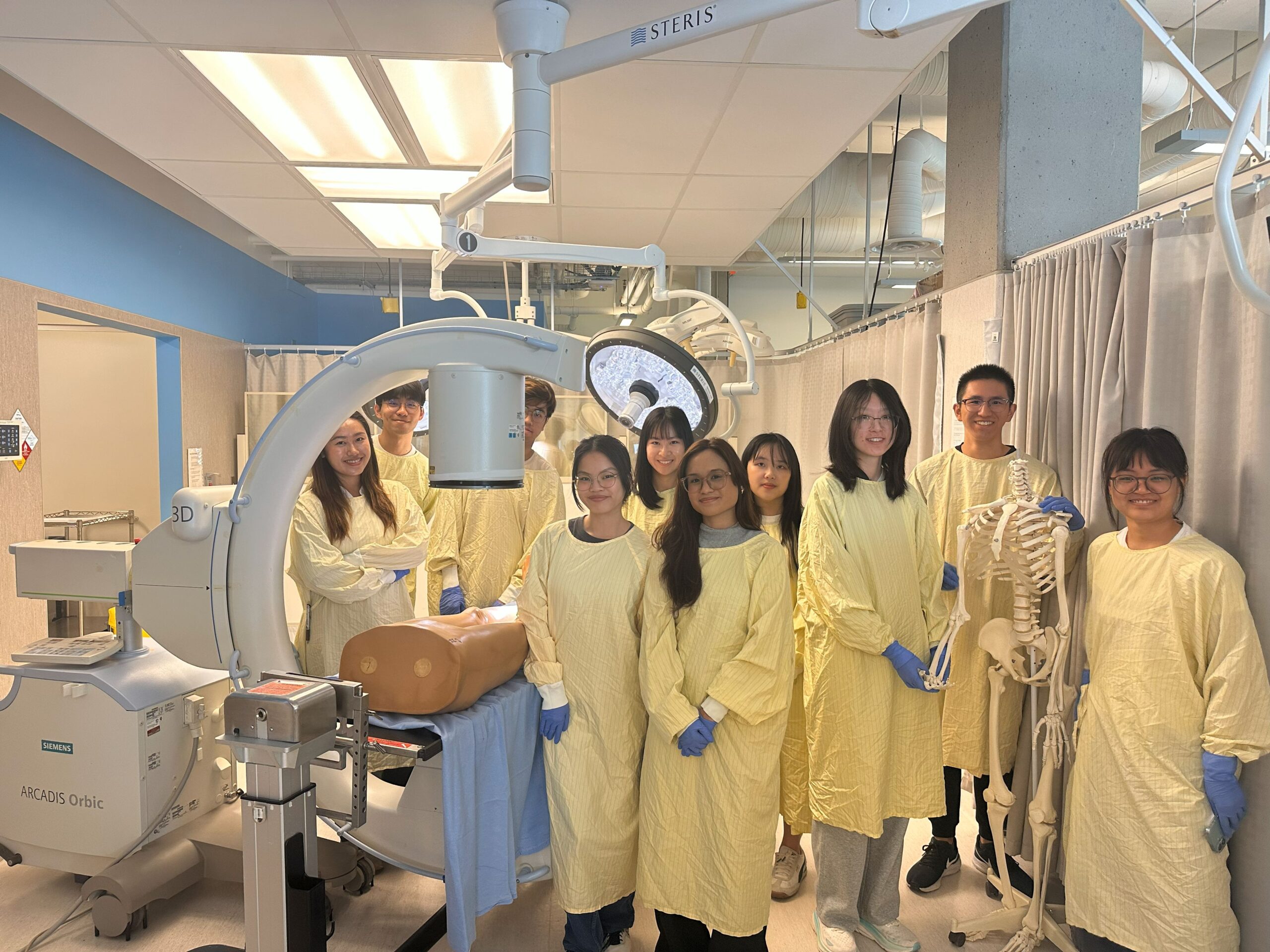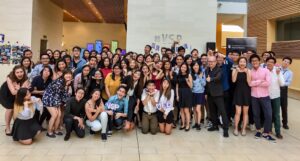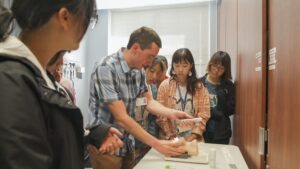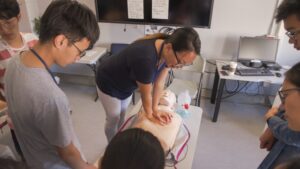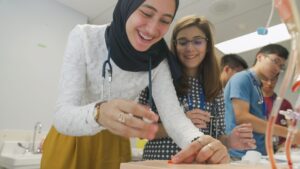The Faculty of Medicine’s Vancouver Summer Program (VSP) is a four-week academic program, offering students a unique opportunity to experience Canadian health and life sciences at its best.
Explore the program from a student’s perspective
Watch our testimonial video for an inside look at what makes the Faculty of Medicine’s VSP unforgettable.
What you might expect/course format
The program consists of a package of two courses, each course comprising approximately 39 hours of class time. Students will learn from experienced faculty, clinicians, investigators and scientists. Classes are highly interactive and may include group discussions, guest lecturers, workshops, research projects, laboratory experiments, and field trips.
As the Faculty of Medicine takes a distributed approach to education, some students can expect to travel to different hospitals or clinical sites for classes or experiential learning, such as a simulation centre workshop, as illustrated in this student story piece. Students may be responsible for the cost of public transit when attending classes off-UBC campus and participating in field trips.
Eligibility
- Medicine VSP course packages are for students studying medicine or related sciences (typically in their first 2-3 years of undergraduate studies).
- Students must be at least 19 years of age on the starting date of the program (July 17, 2026).
- Some course packages have prerequisites, please click on each course package below to view this information. If a student does not meet the pre-requisites but is interested in the course package, they can email med.international@ubc.ca to confirm their eligibility to participate.
July 2026 Course Packages
Introduction to Scientific Research in the Hospital Setting
This course will help students review the scientific basis for conducting research in biology, pharmacology and disciplines of medicine, and help them explore advanced methods of clinical (hospital and clinic based) study designs.
Learn from senior doctors, investigators and scientists how to discover better treatments for severely ill patients and acute emergencies, discuss ethical conduct of studies in adults, children and neonates, how to recruit patients and what can be done to improve patient care through scientific research studies.
This course provides students with solid foundation to appraise scientific literature in clinical disciplines including medicine, public health, and pharmacology.
This course offers you exposure to senior and experienced doctors and scientists who do such research in a large hospital and University.
Learn to read English medical literature and have an opportunity to discuss research that will promote care in acute cases such as those in emergency, or chronic diseases such as the research of cancer. With other students and an academic-mentor in a small group you will develop a group-based research proposal for a new study, present it to the entire course and participate in a fun competition to determine the best scientific research proposal. Receive advice and mentorship to implement your scientific research in the future.
Introduction to Clinical Medicine in the Hospital Setting
In this popular offering, VSP Medicine students will visit a large hospital and hear from physicians in several specialties on the active medical life as they diagnose and treat patients.
Explore a unique hands-on experience and visit the Emergency Room of a large hospital. The course will include an intensive course in life-saving emergency procedures, such as inserting intravenous line, resuscitation skills, reading ECG and interpreting x-rays.
Learn how to take history and conduct a physical exam – and work with physician- and surgeon- educators to acquire skills that focus on cardiac, respiratory, and neurological systems. In small group learning style, discuss common emergency complaints such as fever, abdominal pain and rash to learn the foundations of medicine.
Discuss hospital cases in a wide spectrum of diseases, present patient cases of acutely ill and injured patients such as those seen in an emergency department with a heart attack or after car accidents, as well as chronically ill patients such as those with rheumatoid arthritis.
This course includes advanced use of medical simulators to do intubation, defibrillation, managing airways, and more. All with experienced physicians and educators who are passionate about teaching.
Prerequisites: No prerequisites
Graduating students: Accepted on a case-by-case basis
Minors (students aged under 19 at the start of the program): Not Accepted
Pharmacology Through Case Studies
You will experience an integrated approach to learning pharmacology through the use of simulated clinical cases specifically designed to highlight the fundamental principles. Among the many topics discussed in this course, you will gain a detailed appreciation of the important drugs and drug classes of the cardiovascular, respiratory, gastrointestinal, reproductive, and endocrine systems, as well as the fields of neuropharmacology and autonomic pharmacology. Knowledge acquisition from both the scientific and clinical perspectives will be supported through complementary lectures and a variety of interactive case studies, in addition to hands-on laboratory computer simulations. You will also have the chance to design and present your very own case study, incorporating newly learned pharmacological concepts with your interests. Through this educational model, we hope to integrate your knowledge of pharmacology across multiple related disciplines, and to provide you with a better understanding and appreciation of pharmacology applicable to everyday life.
Computational Medicine and Drug Discovery
This course provides an introduction to biomedical data science, focusing on the computational and statistical analysis of biological data. Students will develop practical skills in R programming for data manipulation, visualization, and analysis, as well as in the Bash command-line environment for efficient data management. Core topics include the tidyverse framework, ggplot2 for scientific figures, and reproducible research practices such as version control and environment management. Students will also gain experience using high-performance computing systems for large-scale analyses. Building on this foundation, the course explores computational medicine, emphasizing how data science advances biomedical discovery and precision therapeutics. Students will analyze real-world gene expression datasets, performing exploratory and differential expression analyses with modern R packages. Advanced topics include signature-based drug repurposing using resources such as the Connectivity Map and LINCS1000. The course culminates in a mentored capstone project, where students apply the complete analytical workflow (from preprocessing to biological interpretation) to identify potential therapeutic candidates. Through these activities, students will gain a comprehensive understanding of computational methods that bridge molecular data analysis with translational biomedical insights.
Prerequisites: No prerequisites
Minors (students aged under 19 at the start of the program): Not Accepted
Psychiatric Disorders and their Pharmacological Treatments
This course will cover the major psychiatric disorders that may include ADHD, schizophrenia, major depressive disorder, anxiety, bipolar disorder, and substance use disorders. Over the duration of the course, we will review the symptoms and neurobiology of these disorders, and then explain how pharmacological therapies work to treat target symptoms. The pharmacology of these drugs will be studied at the molecular level providing the foundation for understanding their clinical application. Finally, treatment strategies will be discussed using the most up-to-date evidence-based treatment guidelines.
The Science Behind the Mind
This course will offer you an introduction to the clinical expression of mental disorders and the associations between the brain and symptoms of illness. The relationship of phenomenology, or the descriptive characterization of symptoms of illness will be illustrated through learning the components of a mental status examination, and review of the neuroanatomy and cerebral mechanisms associated with symptoms of mental disorders. Clinical case examples will be presented throughout using subtitled video material. An opportunity to visit the BC Psychosis Program inpatient unit is being planned. In-class workbook exercises will provide feedback on learning.
Prerequisites: This package will be at a level suitable for students who have completed Year 2 of undergraduate studies in Medicine or have equivalent or related coursework in Health Sciences or Psychology.
Minors (students aged under 19 at the start of the program): Not Accepted
Mood Disorders and Psychosis
This course will provide you with a broad overview of mood disorders (such as clinical depression and bipolar disorder) and psychosis (where reality testing is impaired, such as in schizophrenia). Mood disorders and psychosis are among the most disabling psychiatric conditions worldwide, due to significant symptoms and functional impairments that can lead to both personal distress and substantial economic burden on society. A major focus of this course will be identification and assessment, and accurate differential diagnosis. Additional topics will include epidemiology, neurobiology, psychosocial factors, and a variety of evidence-based interventions and therapies. Classes are lecture-based with group work and discussions, but also may include guided hospital tours, learning directly from patients with mental illness, and other practical experiences.
Introduction to Psychotherapy
This course will provide you with an introduction to the theory and practice of psychotherapy, focusing on core principles and skills that can be applied across a range of clinical and practice contexts. The course will orient you to the evolution of psychotherapy as an evidence-based intervention for common mental health disorders. You will learn about the common elements of major models of psychotherapy within an integrative context. The course will emphasize integration across different psychotherapy orientations, as well as integration of psychotherapy principles across various helping practices. Thus, the course will introduce basic practical skills such as interviewing, assessment, and building and maintaining a therapeutic alliance–skills that can benefit all helping professionals working in various roles. Lectures will include video demonstrations of psychotherapy and role-playing and personal reflection exercises to enhance learning and develop skills. Students are strongly encouraged to ask questions and contribute their thoughts and reflections throughout the course.
Prerequisites: This package will be at a level suitable for students who have completed Year 1 of undergraduate studies in Medicine or have equivalent or related coursework in Health Sciences or Psychology.
Minors (students aged under 19 at the start of the program): Not Accepted
Introduction to Epidemiology and Public Health
Dive into the world of epidemiology and public health and explore the powerful factors that shape the well-being of entire populations! This course empowers you to identify, analyze, and respond to the critical health challenges facing individuals, communities, and nations today. You will discover frameworks for monitoring, assessing, and tackling health issues—from health promotion to disease prevention and beyond.
Get ready to explore a broad range of exciting topics, including epidemiology, health surveillance, and public health strategies. You will not only learn the theory, but also gain hands-on experience through immersive presentations, engaging group projects, thought-provoking class discussions, and field trips that bring real-world health issues to life.
As you develop essential skills in epidemiology, you will begin to think critically about how to assess, monitor and address pressing health concerns in your own community—and on a global scale. Whether you are planning a career in medicine, policy, international development, or in many other areas, this course will lay the foundation for you to clearly understand and communicate about population health, and to make a real impact on health outcomes.
The University of British Columbia’s School of Population and Public Health (SPPH) is recognized as a world leader in public health. These topics are important for those interested in pursuing careers in public health, medicine or health sciences.
Analyzing Public Health Policy using the Social Determinants of Health
What truly shapes our health — personal choices, or the world around us?
In this course, students will dive into the fascinating interplay between individual behavior, social systems and structures, and environmental forces that influence health and wellness. Through real-world examples and critical discussions, you will uncover how factors such as income, education, geography and policy create health advantages for some, and health barriers for others.
Exploring both personal responsibility and systemic inequity, this course highlights how health is not only a consequence of biology or personal behaviours, but also of the environment and opportunity. You will learn how decision-makers apply principles of policy, economics, ethics and social justice to improve population health — and how you can contribute to a healthier, more equitable world.
Prerequisites: No prerequisites
Minors (students aged under 19 at the start of the program): Not Accepted
Recovery from Injury and Disease
This course will introduce students to the science of rehabilitation within the World Health Organization framework. Through this approach, students will understand how severe injuries and chronic diseases can impact the patient and family, both physically and emotionally across the full lifespan. Conditions such as spinal cord injury, stroke, arthritis, and chronic obstructive pulmonary disease will be used to illustrate the journey through rehabilitation, the road to recovery and adjustment to disability. Along this journey, students will be introduced to concepts about the musculoskeletal, cardiovascular, pulmonary, and neurological systems, as well as coping mechanisms and quality of life.
In addition, cutting-edge research on novel rehabilitation treatments will be introduced, including robotic suits to permit walking after spinal cord injury and e-Health (e.g., tele-medicine, video games, wearable sensors) to improve function. Students will use a variety of interactive methods to understand the content, including small group tutorials, and problem-based learning.
Exercise is Medicine
This course will provide an exploration of exercise and physical activity in the treatment of chronic conditions. Through an exploration of chronic conditions such as cancer, cognitive impairment, and musculoskeletal disorders, students will gain an appreciation of the effects of exercise on brain function, bone and muscle health, and cardiovascular function across the lifespan. Topics will also include the epidemiology of physical inactivity, measurement of physical activity in chronic disease, strategies to get a nation and the community more active, role of health professionals in physical activity prevention and treatment, and technology to motivate and deliver physical activity in chronic disease populations.
Students will use a variety of interactive methods to understand the content, including case studies, hands-on physical activity measurement sessions, and problem-based learning. Students will also complete hands-on labs in a state-of-art fitness and exercise research facility designed to enable access for people with chronic disease and disability.
Prerequisites: This package will be at a level suitable for students who have completed an undergraduate-level Biology or Physiology course.
Minors (students aged under 19 at the start of the program): Not Accepted
Introduction to Medical Laboratory Science
You will explore normal and abnormal biochemistry and physiology of blood and organ systems including the liver, gastrointestinal tract, kidneys and brain. You will solve medical case studies and diagnose diseases by interpreting patient history information, physical findings, and results of selected clinical laboratory tests. You will participate in case-based learning, team presentations, interactive lectures, and a hands-on blood cell morphology laboratory session in which you prepare and stain blood smears, then distinguish different cells under the microscope. To broaden your educational experiences, you may also take guided tours of lab facilities. Past students stated they “learned a lot–not only knowledge, but the way to get knowledge…and had lots of fun in this class”. They valued team-work and interacting with instructors who were “very knowledgeable, approachable and kind”.
Fundamental Techniques for Clinical and Medical Research Laboratories
The focus of this course will be to perform methods that are commonly used in hospital and biomedical research laboratories. You will learn through hands-on laboratory sessions and will focus on the following disciplines: molecular biology, cell culture and histochemistry. Experiments you will conduct include DNA finger printing and culturing a mammalian cell line. You will also conduct a series of experiments using different staining techniques and microscopically determine the composition of unknown tissues. Your learning will be supported through demonstrations, discussions of experimental design, data analysis activities and interactive lecture sessions. Past students stated that they “enjoyed extracting and analyzing their own DNA” and that the cell culture labs were “very unique and interesting – something we cannot do in our home country.” They were also “excited to analyze their slides and share with others during their histochemistry presentations”.
Prerequisites: No prerequisites
Minors (students aged under 19 at the start of the program): Not Accepted
Principles of Body Structure and Function
This course will cover foundational functional anatomy including all major organ systems as well as the musculoskeletal system. Students will also learn how these systems are functionally and structurally related to each other. Thoracic anatomy will focus on the cardiovascular and pulmonary systems, abdominal anatomy on the digestive and renal system and pelvic anatomy on the reproductive systems. The musculoskeletal system will be covered from a conceptual point of view focusing on the major functions of the upper and lower limbs and the importance of the musculoskeletal system for human form and structure. This course will give a basic foundation in functional anatomy that will help students as they prepare for life and health sciences programs. Students will have the opportunity to explore these systems on virtual 3D models, scanned from real specimens.
Introduction to Clinical Neuroanatomy
This course will offer foundations of the neuroanatomy along with clinical applications. Students will examine the central nervous system through a combination of classroom activities and use of computer modelling technology to gain a better understanding of the structure and function of the different parts including; spinal cord, brainstem, and cerebrum. During this course, students will have the opportunity to see and learn about the spinal nerves and cranial nerves. In addition, they will learn about some major functional features of the central nervous system such as; balance and equilibrium, hearing, speech, eye movements, and cognition.
Prerequisites: No prerequisites
Minors (students aged under 19 at the start of the program): Not AcceptedUp
Biological Aspects of Aging
This course will focus on the biological underpinnings of aging and their individual and societal implications. It will explore how age-related changes in organs, cells, and tissues impact an individual’s mobility, cognitive function, and brain health. It will also discuss the biology of common age-related impairments in mobility, brain health, and cognitive function. Students will experience a variety of interactive methods to understand the content, including practice-based learning in laboratories, group presentations, and case studies. The group presentation component will allow students to practice critical appraisal of research evidence on biological aging through a scientific conference format presentation and peer evaluation. Students will also visit several state-of-the-art research laboratories and assessment suites at the Centre for Aging SMART to gain hands-on experience.
Clinical Aspects of Aging
This course will introduce clinical aspects of age-related impairment in mobility, brain health, and cognitive function. It will also focus on how lifestyle behaviours performed within the 24-hour day (e.g., physical activity, sedentary behaviour, and sleep) can promote healthy aging. A multidisciplinary group of researchers and clinicians will teach lectures and laboratories and lead visits to clinical facilities to expand students’ understanding of healthy aging. The course will include classroom lectures, hands-on laboratory sessions, group-based coursework, and group presentations. An interdisciplinary group of researchers and clinicians will participate in the course as invited lecturers and provide examples of clinical research in aging conducted at UBC and other academic institutions. With visits to clinical research facilities and state-of-the-art assessment suites, this course will allow students to participate in an interdisciplinary and rich environment to foster learning on contemporary topics of clinical aspects of aging.
Prerequisites: No prerequisites
Minors (students aged under 19 at the start of the program): Not Accepted
From Mechanisms to Clinical Application: Musculoskeletal Injuries and Traumas
Step into the world of modern medicine at the crossroads of engineering, biomechanics, and clinical care. In this course, you’ll explore the full journey of an injury, from the moment excessive forces cause harm, to diagnosis, treatment, and recovery. You will learn how physicians and scientists work together to understand bone fractures, head and spinal cord injuries, and other traumas, and how cutting-edge imaging, artificial intelligence, and surgical technologies are transforming care. As a Vancouver Summer Program student, you’ll go beyond the classroom to experience how research and rehabilitation are integrated into hospital settings. Students will:
– Visit Vancouver General Hospital (the 3rd largest hospital in Canada) to learn about advanced surgical research and rehabilitation technologies
– Explore BC Children’s Hospital to understand pediatric rehabilitation and research in our youngest patients
– Meet and learn from a Physical Medicine and Rehabilitation (PM&R) physician, gaining insight into how biomechanics and rehab science guide patient care
By the end of this course, you will not only understand how injuries happen — but also how research and rehabilitation science come together to transform patient recovery.
Clinical Advancements through Collaborative Innovation
Building on Course A, this course challenges you to think like a clinician-scientist and healthcare innovator. You’ll go beyond textbooks and research papers to engage directly with the people who matter most: patients and individuals with lived experience with injuries and chronic conditions. Their insights will give you a deeper, real-world understanding of the challenges faced in injury prevention, treatment, and recovery.
With this foundation, you will:
– Work closely with researchers and clinicians to explore how injuries are studied, treated, and managed across the lifespan
– Tour GF Strong Rehabilitation Centre (the largest in British Columbia) to see innovations in rehabilitation medicine and patient recovery
– Gain in-depth knowledge of an orthopedic condition, examining treatment options and rehabilitation strategies from both clinical and patient perspectives
– Learn about and apply the biomedical engineering design process, exploring how real-world healthcare innovations are developed, implemented, and evaluated to address patient needs and improve recovery outcomes
This immersive, hands-on approach will draw on your creativity and sharpen your teamwork skills while grounding your learning in human experience. By combining clinical science, engineering design, and patient perspectives, you’ll be empowered to make meaningful contributions to the future of healthcare. With mentorship from outstanding UBC faculty, clinicians, and patient partners, you will graduate from this program with not only technical expertise but also the empathy and insight needed to drive true innovation in medicine.
Prerequisites: No prerequisites
Minors (students aged under 19 at the start of the program): Not Accepted
For more information
Participation in the Vancouver Summer Program in Medicine non-credit course packages does not influence admissibility into UBC Faculty of Medicine undergraduate, graduate and postdoctoral programs.
Please note that the Course Package content is subject to change.
For VSP Medicine-specific questions, please email the Faculty of Medicine Vancouver Summer Program Coordinator at med.international@ubc.ca.
Student testimonials
– Miscah Katawera, VSP Medicine Student
– Luis Felipe Sanz, VSP Medicine Student
